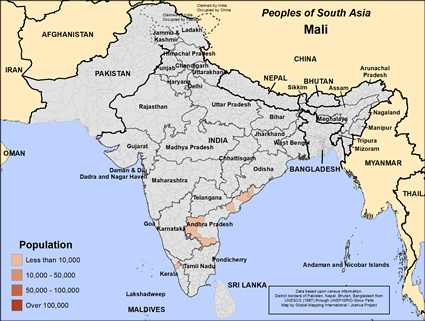The Mali people, an ethnic group primarily residing in the state of Andhra Pradesh, India, have a long history of involvement in horticulture and agriculture. Traditionally known as expert gardeners and floriculturists, the Mali community has maintained their association with farming for generations. Their name itself is derived from the Hindi word "Mali," meaning "gardener." Over time, the Mali people have adapted to changing socio-economic conditions, yet their core identity remains deeply connected to agriculture, especially in rural areas where their traditional knowledge of plants and farming techniques continues to thrive.
The Mali people predominantly work as farmers, specializing in cultivating fruits, vegetables and flowers. Agriculture forms the backbone of their livelihood, with many families owning small plots of land where they grow crops for both subsistence and local markets. The community places a strong emphasis on family and communal labor, with families working together in their fields. Some Mali have transitioned into urban areas, where they find employment in manual labor or small-scale businesses, but a large portion still reside in rural villages, living in modest homes made of brick, mud, and thatch.
Life in the village revolves around the agricultural cycle, with planting, tending and harvesting seasons marking the passage of time. The Mali people also engage in small-scale livestock rearing, further supporting their household economies. Despite their agricultural expertise, many Mali face economic challenges due to limited access to modern farming tools and technologies.
The Mali people practice Hinduism, with their religious life closely tied to the agricultural seasons and natural cycles. They worship gods and goddesses associated with fertility, harvest and protection, such as Vishnu, Lakshmi and Shiva. Rituals and festivals, including Pongal and Diwali, are important events for the Mali community, and they often include prayers for good harvests and prosperity. Ancestral worship also plays a role, as the Mali seek blessings from their forebears to ensure the well-being of their families and crops.
Traditional beliefs in nature spirits and local deities continue to influence their worldview, particularly in rural areas where connection to the land is strong. Many Mali households maintain shrines or sacred spaces in their homes or fields, where offerings are made to ensure the favor of the gods.
The Mali people face significant challenges, particularly related to economic stability and access to modern resources. Many struggle with low incomes due to small-scale farming, lack of irrigation infrastructure, and limited access to education. In some cases, traditional farming methods hinder their ability to compete in modern markets, where larger agribusinesses dominate. Access to healthcare is also limited, particularly in rural areas, and many Mali communities suffer from preventable diseases and malnutrition.
Development programs that focus on providing modern agricultural training, irrigation systems, and access to markets would greatly benefit the Mali people. Improved healthcare and educational opportunities, especially for women and children, are essential for breaking the cycle of poverty.
Pray the hearts of the Mali people would be stirred to hunger after God, to drink of living water.
Pray for family-based Disciple Making Movements to soon transform Mali society, blessing them spiritually and economically.
Pray for the Lord to move in the hearts of believers to give up their own rights and sacrifice their lives to see the Mali people blessed by the work of Jesus Christ, the only savior.
Scripture Prayers for the Mali in India.
Ethnologue: Languages of the World
Reports from Indian agricultural NGOs
Academic research on horticultural communities in Andhra Pradesh
| Profile Source: Joshua Project |











